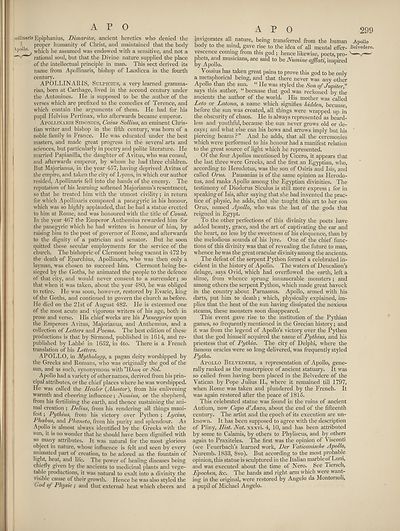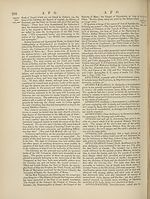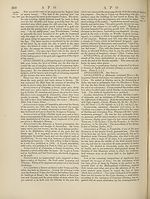Encyclopaedia Britannica > Volume 3, Anatomy-Astronomy
(307) Page 299
Download files
Complete book:
Individual page:
Thumbnail gallery: Grid view | List view

A P O
)ollinaris Epiphanius, Dimaritce, ancient heretics who denied the
II proper humanity of Christ, and maintained that the body
\ polio. w}1;c}1 jie assumed was endowed with a sensitive, and not a
rational soul, but that the Divine nature supplied the place
of the intellectual principle in man. This sect derived its
name from Apollinaris, bishop of Laodicea in the fourth
century.
APOLLINARIS, Sulpicius, a very learned gramma¬
rian, born at Carthage, lived in the second century under
the Antonines. He is supposed to be the author of the
verses which are prefixed to the comedies of Terence, and
which contain the arguments of them. He had for his
pupil Helvius Pertinax, who afterwards became emperor.
Apollinaris Sidonius, Caius Sollius, an eminent Chris¬
tian writer and bishop in the fifth century, was born of a
noble family in France. He was. educated under the best
masters, and made great progress in the several arts and
sciences, but particularly in poetry and polite literature. He
married Papianilla, the daughter of Avitus, who was consul,
and afterwards emperor, by whom he had three children.
But Majorianus, in the year 457, having deprived Avitus of
the empire, and taken the city of Lyons, in which our author
resided, Apollinaris fell into the hands of the enemy. The
reputation of his learning softened Majorianus’s resentment,
so that he treated him with the utmost civility; in return
for which Apollinaris composed a panegyric in his honour,
which was so highly applauded, that he had a statue erected
to him at Rome, and was honoured with the title of Count.
In the year 467 the Emperor Anthemius rewarded him for
the panegyric which he had written in honour of him, by
raising him to the post of governor of Rome, and afterwards
to the dignity of a patrician and senator. But he soon
quitted these secular employments for the service of the
church. The bishopric of Clermont being vacant in 472 by
the death of Eparchius, Apollinaris, who was then only a
layman, was chosen to succeed him. Clermont being be¬
sieged by the Goths, he animated the people to the defence
of that city, and would never consent to a surrender; so
that when it was taken, about the year 480, he was obliged
to retire. He was soon, however, restored by Evaric, king
of the Goths, and continued to govern the church as before.
He died on the 21st of August 482. He is esteemed one
of the most acute and vigorous writers of his age, both in
prose and verse. His chief works are his Panegyrics upon
the Emperors Avitus, Majorianus, and Anthemius, and a
collection of Letters and Poems. The best edition of these
productions is that by Sirmond, published in 1614, and re¬
published by Labbe in 1652, in 4to. There is a French
translation of his Letters.
APOLLO, in Mythology, a pagan deity worshipped by
the Greeks and Romans, who was originally the god of the
sun, and as such, synonymous with "HAios or Sol.
Apollo had a variety of other names, derived from his prin¬
cipal attributes, or the chief places where he was worshipped.
He was called the Healer (Akestor), from his enlivening
warmth and cheering influence; Nomius, or the shepherd,
from his fertilizing the earth, and thence sustaining the ani¬
mal creation ; Delius, from his rendering all things mani¬
fest ; Pythius, from his victory over Python ; Lycius,
Phoebus, and Phaneta, from his purity and splendour. As
Apollo is almost always identified by the Greeks with the
sun, it is no wonder that he should have been dignified with
so many attributes. It was natural for the most glorious
object in nature, whose influence is felt and seen by every
animated part ot creation, to be adored as the fountain of
light, heat, and life. The power of healing diseases being
chiefly given by the ancients to medicinal plants and vege¬
table productions, it was natural to exalt into a divinity the
visible cause of their growth. Hence he was also styled the
ijod of Physic ; and that external heat which cheers and
A P O 299
invigorates all nature, being transferred from the human Apollo
body to the mind, gave rise to the idea of all mental effer- Belvedere.
vescence coming from this god ; hence likewise, poets, pro- v v
phets, and musicians, are said to be Numine afflati, inspired
by Apollo. r
Vossius has taken great pains to prove this god to be only
a metaphoi ical being, and that there never was anv other
Apollo than the sun. “ He was styled the Son of Jupiterf
says this author, “ because that god was reckoned by the
ancients the author of the world. His mother was called
Leto or Latona, a name which signifies hidden, because,
before the sun was created, all things were wrapped up in
the obscurity of chaos. He is always represented as beard¬
less and youthful, because the sun never grows old or de¬
cays ; and what else can his bows and arrows imply but his '
piercing beams?” And he adds, that all the ceremonies
which were performed to his honour had a manifest relation
to the great source of light which he represented.
Of the four Apollos mentioned by Cicero, it appears that
the last three were Greeks, and the first an Egyptian, who,
according to Herodotus, was the son of Osiris and Isis, and
called Orus. Pausanias is of the same opinion as Herodo¬
tus, and ranks Apollo among the Egyptian divinities. The
testimony of Diodorus Siculus is still more express ; for in
speaking of Isis, after saying that she had invented the prac¬
tice of physic, he adds, that she taught this art to her son
Orus, named Apollo, who was the last of the gods that
reigned in Egypt.
To the other perfections of this divinity the poets have
added beauty, grace, and the art of captivating the ear and
the heart, no less by the sweetness of his eloquence, than by
the melodious sounds of his lyre. One of the chief func¬
tions of this divinity was that of revealing the future to man,
whence he was the great oracular divinity among the ancients.
The defeat of the serpent Python formed a celebrated in¬
cident in the history of Apollo. The waters of Deucalion’s
deluge, says Ovid, which had overflowed the earth, left a
slime, from whence sprung innumerable monsters; and
among others the serpent Python, which made great havock
in the country about Parnassus. Apollo, armed with his
darts, put him to death; which, physically explained, im¬
plies that the heat of the sun having dissipated the noxious
steams, these monsters soon disappeared.
This event gave rise to the institution of the Pythian
games, so frequently mentioned in the Grecian history; and
it was from the legend of Apollo’s victory over the Python
that the god himself acquired the name of Pythius, and his
priestess that of Pythia. The city of Delphi, where the
famous oracles were so long delivered, was frequently styled
Pytho.
Apollo Belvedere, a representation of Apollo, gene¬
rally ranked as the masterpiece of ancient statuary. It was
so called from having been placed in the Belvedere of the
Vatican by Pope Julius II., where it remained till 1797,
when Rome was taken and plundered by the French. It
was again restored after the peace of 1815.
This celebrated statue was found in the ruins of ancient
Antium, now Capo d’Anzo, about the end of the fifteenth
century. The artist and the epoch of its execution are un¬
known. It has been supposed to agree with the description
of Pliny, Hist. Nat. xxxvi. 4, 10, and has been attributed
by some to Calamis, by others to Phyliscus, and by others
again to Praxiteles. The first was the opinion of Visconti
(see Feuerbach’s learned work, Der Vaticanische Apollo,
Nuremb. 1833, 8vo). But according to the most probable
opinion, this statue is sculptured in the Italian marble of Luni,
and was executed about the time of Nero. See liersch,
Epochen, &c. The hands and right arm which were want¬
ing in the original, were restored by Angelo da Montorsoli,
a pupil of Michael Angelo.
)ollinaris Epiphanius, Dimaritce, ancient heretics who denied the
II proper humanity of Christ, and maintained that the body
\ polio. w}1;c}1 jie assumed was endowed with a sensitive, and not a
rational soul, but that the Divine nature supplied the place
of the intellectual principle in man. This sect derived its
name from Apollinaris, bishop of Laodicea in the fourth
century.
APOLLINARIS, Sulpicius, a very learned gramma¬
rian, born at Carthage, lived in the second century under
the Antonines. He is supposed to be the author of the
verses which are prefixed to the comedies of Terence, and
which contain the arguments of them. He had for his
pupil Helvius Pertinax, who afterwards became emperor.
Apollinaris Sidonius, Caius Sollius, an eminent Chris¬
tian writer and bishop in the fifth century, was born of a
noble family in France. He was. educated under the best
masters, and made great progress in the several arts and
sciences, but particularly in poetry and polite literature. He
married Papianilla, the daughter of Avitus, who was consul,
and afterwards emperor, by whom he had three children.
But Majorianus, in the year 457, having deprived Avitus of
the empire, and taken the city of Lyons, in which our author
resided, Apollinaris fell into the hands of the enemy. The
reputation of his learning softened Majorianus’s resentment,
so that he treated him with the utmost civility; in return
for which Apollinaris composed a panegyric in his honour,
which was so highly applauded, that he had a statue erected
to him at Rome, and was honoured with the title of Count.
In the year 467 the Emperor Anthemius rewarded him for
the panegyric which he had written in honour of him, by
raising him to the post of governor of Rome, and afterwards
to the dignity of a patrician and senator. But he soon
quitted these secular employments for the service of the
church. The bishopric of Clermont being vacant in 472 by
the death of Eparchius, Apollinaris, who was then only a
layman, was chosen to succeed him. Clermont being be¬
sieged by the Goths, he animated the people to the defence
of that city, and would never consent to a surrender; so
that when it was taken, about the year 480, he was obliged
to retire. He was soon, however, restored by Evaric, king
of the Goths, and continued to govern the church as before.
He died on the 21st of August 482. He is esteemed one
of the most acute and vigorous writers of his age, both in
prose and verse. His chief works are his Panegyrics upon
the Emperors Avitus, Majorianus, and Anthemius, and a
collection of Letters and Poems. The best edition of these
productions is that by Sirmond, published in 1614, and re¬
published by Labbe in 1652, in 4to. There is a French
translation of his Letters.
APOLLO, in Mythology, a pagan deity worshipped by
the Greeks and Romans, who was originally the god of the
sun, and as such, synonymous with "HAios or Sol.
Apollo had a variety of other names, derived from his prin¬
cipal attributes, or the chief places where he was worshipped.
He was called the Healer (Akestor), from his enlivening
warmth and cheering influence; Nomius, or the shepherd,
from his fertilizing the earth, and thence sustaining the ani¬
mal creation ; Delius, from his rendering all things mani¬
fest ; Pythius, from his victory over Python ; Lycius,
Phoebus, and Phaneta, from his purity and splendour. As
Apollo is almost always identified by the Greeks with the
sun, it is no wonder that he should have been dignified with
so many attributes. It was natural for the most glorious
object in nature, whose influence is felt and seen by every
animated part ot creation, to be adored as the fountain of
light, heat, and life. The power of healing diseases being
chiefly given by the ancients to medicinal plants and vege¬
table productions, it was natural to exalt into a divinity the
visible cause of their growth. Hence he was also styled the
ijod of Physic ; and that external heat which cheers and
A P O 299
invigorates all nature, being transferred from the human Apollo
body to the mind, gave rise to the idea of all mental effer- Belvedere.
vescence coming from this god ; hence likewise, poets, pro- v v
phets, and musicians, are said to be Numine afflati, inspired
by Apollo. r
Vossius has taken great pains to prove this god to be only
a metaphoi ical being, and that there never was anv other
Apollo than the sun. “ He was styled the Son of Jupiterf
says this author, “ because that god was reckoned by the
ancients the author of the world. His mother was called
Leto or Latona, a name which signifies hidden, because,
before the sun was created, all things were wrapped up in
the obscurity of chaos. He is always represented as beard¬
less and youthful, because the sun never grows old or de¬
cays ; and what else can his bows and arrows imply but his '
piercing beams?” And he adds, that all the ceremonies
which were performed to his honour had a manifest relation
to the great source of light which he represented.
Of the four Apollos mentioned by Cicero, it appears that
the last three were Greeks, and the first an Egyptian, who,
according to Herodotus, was the son of Osiris and Isis, and
called Orus. Pausanias is of the same opinion as Herodo¬
tus, and ranks Apollo among the Egyptian divinities. The
testimony of Diodorus Siculus is still more express ; for in
speaking of Isis, after saying that she had invented the prac¬
tice of physic, he adds, that she taught this art to her son
Orus, named Apollo, who was the last of the gods that
reigned in Egypt.
To the other perfections of this divinity the poets have
added beauty, grace, and the art of captivating the ear and
the heart, no less by the sweetness of his eloquence, than by
the melodious sounds of his lyre. One of the chief func¬
tions of this divinity was that of revealing the future to man,
whence he was the great oracular divinity among the ancients.
The defeat of the serpent Python formed a celebrated in¬
cident in the history of Apollo. The waters of Deucalion’s
deluge, says Ovid, which had overflowed the earth, left a
slime, from whence sprung innumerable monsters; and
among others the serpent Python, which made great havock
in the country about Parnassus. Apollo, armed with his
darts, put him to death; which, physically explained, im¬
plies that the heat of the sun having dissipated the noxious
steams, these monsters soon disappeared.
This event gave rise to the institution of the Pythian
games, so frequently mentioned in the Grecian history; and
it was from the legend of Apollo’s victory over the Python
that the god himself acquired the name of Pythius, and his
priestess that of Pythia. The city of Delphi, where the
famous oracles were so long delivered, was frequently styled
Pytho.
Apollo Belvedere, a representation of Apollo, gene¬
rally ranked as the masterpiece of ancient statuary. It was
so called from having been placed in the Belvedere of the
Vatican by Pope Julius II., where it remained till 1797,
when Rome was taken and plundered by the French. It
was again restored after the peace of 1815.
This celebrated statue was found in the ruins of ancient
Antium, now Capo d’Anzo, about the end of the fifteenth
century. The artist and the epoch of its execution are un¬
known. It has been supposed to agree with the description
of Pliny, Hist. Nat. xxxvi. 4, 10, and has been attributed
by some to Calamis, by others to Phyliscus, and by others
again to Praxiteles. The first was the opinion of Visconti
(see Feuerbach’s learned work, Der Vaticanische Apollo,
Nuremb. 1833, 8vo). But according to the most probable
opinion, this statue is sculptured in the Italian marble of Luni,
and was executed about the time of Nero. See liersch,
Epochen, &c. The hands and right arm which were want¬
ing in the original, were restored by Angelo da Montorsoli,
a pupil of Michael Angelo.
Set display mode to:
![]() Universal Viewer |
Universal Viewer | ![]() Mirador |
Large image | Transcription
Mirador |
Large image | Transcription
Images and transcriptions on this page, including medium image downloads, may be used under the Creative Commons Attribution 4.0 International Licence unless otherwise stated. ![]()
| Encyclopaedia Britannica > Encyclopaedia Britannica > Volume 3, Anatomy-Astronomy > (307) Page 299 |
|---|
| Permanent URL | https://digital.nls.uk/193761339 |
|---|
| Attribution and copyright: |
|
|---|---|
| Shelfmark | EB.16 |
|---|---|
| Description | Ten editions of 'Encyclopaedia Britannica', issued from 1768-1903, in 231 volumes. Originally issued in 100 weekly parts (3 volumes) between 1768 and 1771 by publishers: Colin Macfarquhar and Andrew Bell (Edinburgh); editor: William Smellie: engraver: Andrew Bell. Expanded editions in the 19th century featured more volumes and contributions from leading experts in their fields. Managed and published in Edinburgh up to the 9th edition (25 volumes, from 1875-1889); the 10th edition (1902-1903) re-issued the 9th edition, with 11 supplementary volumes. |
|---|---|
| Additional NLS resources: |
|

